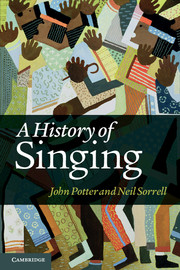Book contents
- Frontmatter
- Contents
- Acknowledgements
- Introduction
- Part I Imagined voices
- Part II Historical voices
- Chapter 3 The emerging soloist and the primacy of text
- Chapter 4 The age of the virtuoso
- Chapter 5 The nineteenth-century revolution
- Part III Recorded voices
- Chapter 7 Classical singing in the twentieth century: recording and retrenchment
- Chapter 8 Post-classical: beyond the mainstream
- Chapter 9 The emancipation of the popular voice
- Chapter 10 Sung and unsung: singers and songs of the non-English-speaking world
- Sources and references
- Bibliography
- Index
Chapter 5 - The nineteenth-century revolution
Published online by Cambridge University Press: 05 June 2012
- Frontmatter
- Contents
- Acknowledgements
- Introduction
- Part I Imagined voices
- Part II Historical voices
- Chapter 3 The emerging soloist and the primacy of text
- Chapter 4 The age of the virtuoso
- Chapter 5 The nineteenth-century revolution
- Part III Recorded voices
- Chapter 7 Classical singing in the twentieth century: recording and retrenchment
- Chapter 8 Post-classical: beyond the mainstream
- Chapter 9 The emancipation of the popular voice
- Chapter 10 Sung and unsung: singers and songs of the non-English-speaking world
- Sources and references
- Bibliography
- Index
Summary
The hundred years from the end of the eighteenth century to the end of the nineteenth century saw more identifiable changes in singing than any earlier comparable period. There are, of course, purely vocal reasons for any sort of change – a new generation of singers will have new composers to negotiate with, older singers retire and new stars rise. But underlying and fuelling this perennial evolution were social and political upheavals, especially in Italy and France, that affected the whole of Europe. Italian singing continued to be exported to the rest of Europe and increasingly to the Americas during the first quarter of a century or so, but then in a relatively short space of time the centre of gravity passed from Naples, Rome, Milan and Bologna to Paris, London and St Petersburg, with Paris at the centre of creative endeavour. The French capital was prone to social and political upheaval, one of the consequences of which was frequent bouts of renewal and regeneration in its artistic life. It was also within easy reach of London and several other major north European cities, which if you were a singer made it a logical place to establish a career. Promoters, composers and performers were irresistibly drawn to its opera houses and concert halls.
It was possible for anyone with enough capital to set up an opera house and post-Revolution Paris had at least three at any one time, whose names and sites seemed to change as often as their casts. The Académie royale de musique was the national house, L’Opéra, which put on grand opera; the Opéra-Comique did not necessarily put on comic opera, but the Théâtre italien was dedicated to Italian language productions and it was there that Rossini had his greatest triumphs after moving to the city in 1823. Big names at the opera meant fashionable soirées, which successful singers would be paid to attend. Pedagogy became increasingly institutionalised, more complicated and in some respects unable to keep up with new demands composers were putting on singers. There were new voices – increasingly French or German – for new roles, and by the end of the century the role itself would be transferable between singers without rewriting for the individual performer.
- Type
- Chapter
- Information
- A History of Singing , pp. 109 - 148Publisher: Cambridge University PressPrint publication year: 2012



